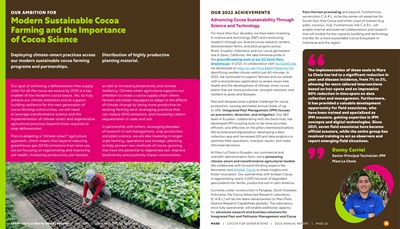
OUR AMBITION FOR
Modern Sustainable Cocoa
Farming and the Importance
of Cocoa Science
Deploying climate-smart practices across
our modern sustainable cocoa farming
programs and partnerships.
Distribution of highly productive
planting material.
Our goal of achieving a deforestation-free supply
chain for all the cocoa we source by 2025 is a key
enabler of low footprint cocoa beans. Yet, to truly
achieve our climate ambitions and to support
building resilience for the next generation of
cocoa farming communities, we will need
to leverage transformative science and the
implementation of climate-smart and regenerative
agricultural practices beyond those required to
stop deforestation.
Mars is adopting a "climate-smart" agriculture
approach, which means that beyond reducing
greenhouse gas (GHG) emissions from land use,
we are focusing on regenerating and improving
soil health, increasing productivity per hectare,
as well as increasing biodiversity and climate
resiliency. Climate-smart agriculture supports our
ambition to create a cocoa supply chain where
farmers are better equipped to adapt to the effects
of climate change by being more productive on
existing farming land, leveraging practices that
can reduce GHG emissions, and increasing carbon
sequestration in trees and soil.
In partnership with others, leveraging decades
of research in soil management, crop production
and plant science, we are also investing in largerscale
farming, operations and strategic planning
to help pioneer new methods of cocoa-growing
that have the potential to regenerate soil, improve
biodiversity and positively impact communities.
OUR 2022 ACHIEVEMENTS
Advancing Cocoa Sustainability Through
Science and Technology
For more than four decades, we have been investing
in science and technology (S&T) and conducting
research through our diverse cocoa research centers,
demonstration farms, and pilot projects across
Brazil, Ecuador, Indonesia, and our cocoa germplasm
site in Davis, California. We take immense pride in
the groundbreaking work at our UC Davis Mars
Greenhouse. In 2021, in collaboration with SwissDeCode,
we developed an easy-to-use Virus Rapid Detection Kit
identifying swollen shoots within just 60 minutes. In
2022, we continued to support farmers and our planet
with a revolutionary application to assess cacao tree
health and the development of climate-smart cocoa
plants that are more productive, drought-resistant, and
resilient to pests and diseases.
Pest and diseases pose a global challenge for cocoa
production, causing estimated annual losses of up
to 35%. Integrated Pest Management (IPM) focuses
on prevention, detection, and mitigation. Our S&T
team in Ecuador, collaborating with the Davis Hub, has
developed IPM scouting tools to be more accurate,
efficient, and effective on the pillars mentioned before.
We've embraced digitalization developing a data
collection app and harnessed GIS and data analytics to
optimize field operations, interpret results, and make
informed decisions.
At Mars La Chola in Ecuador, our commercial and
scientific demonstration farm, we're pioneering
climate-smart and transformative agricultural models.
We collaborate with forward-thinking experts like
Kennemer and Andean Cacao to share insights and
foster innovation. Our partnership with Andean Cacao
is regenerating nearly 3,000 hectares of degraded
pastureland into fertile, productive soil in Latin America.
Currently under construction in Pangkep, South Sulawesi,
Indonesia, the Cocoa Advanced Research Laboratory
(C.A.R.L.) will be the latest advancement to Mars Plant
Science Research Capabilities globally. The Laboratory,
once fully operational, will enable additional capacity
for advanced research and business solutions for
Integrated Pest and Pollinator Management and Cocoa
Post-Harvest processing and beyond. Furthermore,
we envision C.A.R.L. to be the center-of-expertise for
South-East Asia Cocoa and other crops of interest (e.g.
palm, coconut, rice). Furthermore, the C.A.R.L. will
enable internal and external collaborations and research
that will enable further capacity building and technology
transfer for a more sustainable Cocoa Ecosystem in
Indonesia and the region.
The implementation of these tools in Mars
La Chola has led to a significant reduction in
pest and disease incidence, from 7% to 2%,
allowing for more tailored interventions
based on hot-spots and an impressive
80% reduction in time spent on data
collection and management. Furthermore,
it has provided a valuable development
opportunity for field associates, who
have been trained and specialized as
IPM scouters, gaining expertise in IPM
concepts and digital technologies. Since
2021, seven field associates have become
official scouters, while the entire group has
received training to act as observers and
report emerging field situations.
Denny Carriel
Senior Principal Technician IPM
Mars La Chola
CREATING A CLIMATE-SMART FUTURE | MODERN SUSTAINABLE COCOA FARMING MARS | COCOA FOR GENERATIONS | 2022 ANNUAL REPORT | PAGE 22